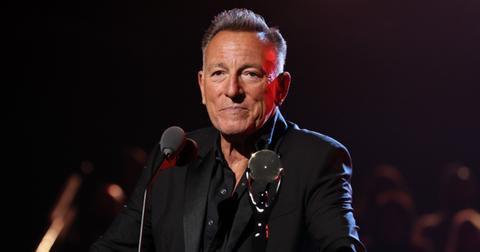Bruce Springsteen's "Born in the U.S.A." Is a Statement About Post-War Treatment of Veterans
Feb. 2 2023, Published 4:43 p.m. ET

There are few music icons with the presence in the industry that Bruce Springsteen has. The New Jersey-native rocker has been entertaining millions of fans across the globe for over fifty years, and in that time has sold more than 140 million records internationally, making him one of the world's best-selling music artists.
Out of his remarkable discography, a few songs have stood out to fans as iconic examples of Bruce's musical skills. One such example of that is his classic track "Born in the U.S.A.," but what exactly is the meaning of the song? Keep reading for a breakdown of the inspiration behind the definitive hit.

What is the meaning of "Born in the U.S.A."?
When your song is ranked 275th on Rolling Stone's list of "The 500 Greatest Songs of All Time," it's beyond clear that its impact has transcended generations and remained as poignant today as it was when it released. Bruce's "Born in the U.S.A." is exactly that — a classic example of classic rock music that carries an important message about how veterans fared economically upon returning home from war.
From its first lyrics, Bruce sets a dark tone for "Born in the U.S.A." "Born down in a dead man's town / The first kick I took was when I hit the ground / You end up like a dog that's been beat too much / Till you spend half your life just covering up," he sings, referring to the trials and tribulations the song's subject has faced since a young age.
The story of how a troubled boy ends up at war continues as the song goes on. "Got in a little hometown jam / So they put a rifle in my hand / Sent me off to a foreign land / To go and kill the yellow man."
Next, Bruce sings about the veteran's return home and the lack of work he finds when he's back. "Come back home to the refinery / Hiring man says, 'Son, if it was up to me' / Went down to see my V.A. man / He said, 'Son, don't you understand,'" referring to how sparse work was at the time.
Released roughly ten years after the Vietnam War ended, Bruce's song serves as a candid reflection of how the decade after the war served those who fought in it on the homefront. "Down in the shadow of the penitentiary / Out by the gas fires of the refinery," he sings, possibly referring to the Bayway Refinery and East Jersey State Prison, which are close to one another in his home state. He doubles down by singing, "I'm ten years burning down the road / Nowhere to run ain't got nowhere to go."
Throughout the song, Bruce repeats the title line, "Born in the U.S.A." many times. Its repetition can be interpreted as almost a chant of protest against the economic circumstances that befell America's soldiers when they were no longer of use to the military. Although these individuals were all "Born in the U.S.A." and defended it with their lives, Bruce implies that many were cast aside by society and had any notion of the "American dream" taken away from them.